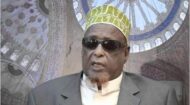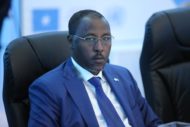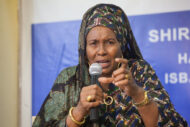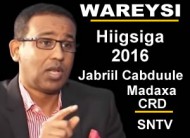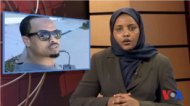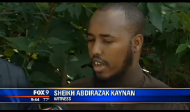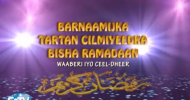

Last month I attended two events in DC that focused on Somalia. Both left much to be desired and were woefully inadequate in giving a nuanced picture of Somalia. I will try to tackle the flagrant inaccuracies and glaring omissions of each.
The first event was held at the Institute of World Politics (IWP). Had I known that IWP is neoconservative and issues masters degrees in defense and security, I probably would have avoided it. But seeing as the speaker was a native Somali with an interesting background I thought, why not. The title of the talk was “What is Al Shabaab and how to Counter it” which can be watched here. Sharmaake began by discussing the rise of the Islamic Courts Union (ICU) and the coalescing of the Somali community around the unifying force of religion. He claimed that the ICU arose from “inter-clan fighting,” although others more convincingly argue that the ICU arose from the vacuum created by the illegitimate and corrupt TFG (Transitional Federal Government). He then said that the extremist elements within the ICU posed a threat to the TFG which prompted it to “ask Ethiopia to come in and assist them.”
Sharmaake chose to avoid the word “invasion” which more aptly describes what happened in 2006-2007. Ethiopian troops invaded at the behest of an undemocratic government that had no support of the Somali people, leading to thousands of civilian deaths, rapes, and injuries. He also failed to mention the adverse effects of foreign interventions by Ethiopia, Kenya, and AMISOM troops. And nothing about US tacit support of the invasion, its disastrous meddling in Somalia’s reconciliation efforts, and its covert operations in the ‘Global War on Terror.’ All this has impinged on Somali sovereignty and self-determination. Overall Sharmaake’s talk seemed to be ripped straight out of a US foreign policy play book in its one-sidedness. Al Shabaab is worth demonizing but to completely ignore the equally demonic role of the TFG and all other puppet governments forged in swanky international conferences with the support of the ‘international community’ is revisionist history.
Unfortunately the distortions continued in the second event I attended held at the Wilson Center. The Center is considered ‘centrist’ in that it doesn’t prescribe to political extremes. But it seems that centrism is indistinguishable from neoconservatism when it comes to Somalia. The panel entitled A Lens on Somalia: Security and Development Going Forward had no Somali speakers and included one non-American. The discussion opened with Kebede giving an overview of the structure of Al Shabaab. Although this was to be expected I still couldn’t suppress the urge to roll my eyes. Must every discussion about Somalia be within the prism of security? Isn’t there more to Somali history and politics than the Shabaab, which is a recent phenomenon formed within a particular context? But Kebede failed to provide that context with no mention of the failures of the TFG, nor the ICU or Ethiopian invasion. He only addressed this after being pressured by audience members, including myself, who posed tough questions about the biased narrative being peddled by the panelists.
The next speaker, named Lyons, focused on the need for regional involvement in stabilizing Somalia. Shockingly, Lyons suggested that Ethiopia and Kenya should take the lead. Lyons acknowledged the deeply controversial relationship between these countries, but that such scruples should be put aside because it’s Somalia’s only chance for progress. Lyons refused to even entertain the idea of Somalia reviving its national army and defense infrastructure. An audience member who identified as Ethiopian angrily confronted Lyons by asking how he could propose a former occupier to be neutrally involved in Somalia. But he remained steadfast in his condescending lack of hope in Somalia to solve its own problems.
The last panelist finally moved beyond the talk of security to a discussion of development. Sadly what didn’t change was the implicit message of Somalia’s lack of agency. Greenberg introduced the “New Deal for Engagement in Fragile States,” a program that provides peace building assistance to conflict-ridden states through support of donors and international organizations. Greenberg summarized the challenges and opportunities of the New Deal in Somalia’s pilot program. One challenge was the lack of consultation with civil society making this largely external project very top-down. I asked Greenberg how the Peacebuilding and Statebuilding Goals aligned with the existing goals of the new Somali government. She said she wasn’t sure if they did. So the New Deal is essentially the same old development policy game, in which Somalia follows the dictates of international consultants and implements solutions made in distant conferences. The ability for Somalia to create its own peacebuilding goals without the need of foreign donors is also foreclosed.
Despite the disillusionment with American think tanks and institutions this has caused, I’m keeping my eye out for other talks on Somalia. Hopefully more will be committed to the truth rather than their respective ideological biases.
Ossob Mohamud, is from Somalia and was born and partly raised in Doha, Qatar as well as Virginia, USA. She is a recent graduate with an international politics degree. Ossob hopes to one day see a thriving, independent and self-loving Somalia and Africa.

 All Posts
All Posts

